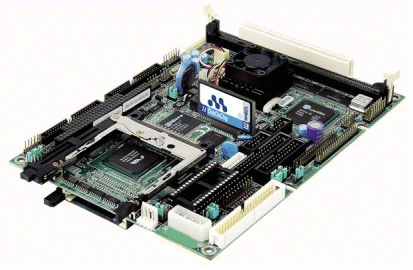M-Systems unveils USB-interfaced Flash-disk for embedded apps
Jul 21, 2003 — by LinuxDevices Staff — from the LinuxDevices Archive — 8 views M-Systems, the company that achieved notoriety in the embedded market through its invention of the chip-like “DiskOnChip” embedded Flash-disk, has announced a next-generation modular embedded Flash module standard — one that plugs into embedded boards via a USB 2.0 signal interface implemented on a dual-inline connector.
M-Systems, the company that achieved notoriety in the embedded market through its invention of the chip-like “DiskOnChip” embedded Flash-disk, has announced a next-generation modular embedded Flash module standard — one that plugs into embedded boards via a USB 2.0 signal interface implemented on a dual-inline connector.
The new module — dubbed the “uDiskOnChip” — offers functional and signal-level compatibility with the industry standard USB 2.0 peripheral device interface, including plug-and-play operating system support, and is primarily intended to be used as a Flash storage add-in module for single-board computers (SBCs) and industrial PCs, the company said. The device measures 1.9 x 1.2 x 5.9 x 0.23 in., and it interfaces with the system via an 18-pin (9×2) dual-row header rather than via a normal USB connector.

uDiskOnChip plugs into a dual-inline header on an SBC
According to M-Systems, within that tiny uDiskOnChip module are an internal ARM7-TDMI 32-bit RISC processor, a controller for single- or multi-level NAND Flash memory interface, a co-processor for security and encryption functions, and, of course, the Flash memory itself. The embedded ARM7 processor is said to implement M-Systems' proprietary “True Flash File System” (TFFS) Flash memory control firmware along with several other proprietary software technologies that optimize the reliability, life span, and security of the data stored in the device. M-System said the device also implements encryption algorithms (including DES, 3DES, SHA-1, and RSA) and provides an API (application programming interface) through which developers can safeguard private system or user data in password-protected regions of the device's internal Flash memory.
Because the device implements standard USB 2.0 “Plug-and-Play” functionality, no special operating system software is required, in contrast to the original EPROM-like DiskOnChip modules.
M-Systems also offers an “iDiskOnChip” family that plugs into standard IDE (ATA) drive interface connectors. Both the uDiskOnChip and the older iDiskOnChip compete with CompactFlash; but unlike CompactFlash, both use standard interface signals (IDE, USB) that are readily available on virtually all “embedded PC” SBCs. However, unlike the iDiskOnChip, the uDiskOnChip does require a special connector — a dual-row header version of USB.
M-Systems apparently hopes their dual-row USB connector will become a new industry standard for Flash-disk expansion on SBCs, replacing the need for the larger DiskOnChip sockets that are often found on today's SBCs. Additionally, the inclusion of control firmware within the uDiskOnChip (as with CompactFlash) eliminates the need for the OS-specific support software and occasional firmware updates that are typically required with the original EPROM-like DiskOnChip, which presents a more primordial interface to the system
Prototypes of the new uDiskOnChip are available now, and “engineering samples” of the device in a capacity of 512 megabytes are planned for Q4 2003. Full product quanties should be available within 3-6 months thereafter, with capacities doubling approximately every three months, reaching 6 gigabytes by the end of 2004, the company said.
This article was originally published on LinuxDevices.com and has been donated to the open source community by QuinStreet Inc. Please visit LinuxToday.com for up-to-date news and articles about Linux and open source.